Dear Blog Readers,
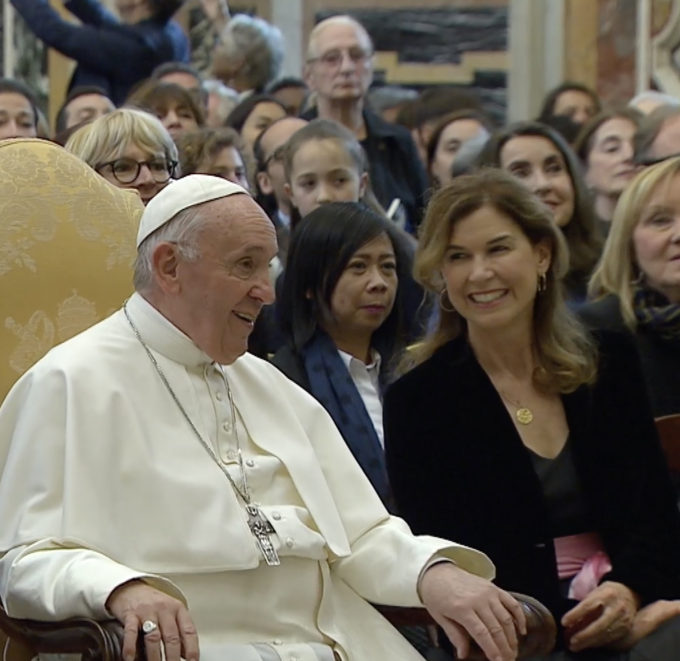
Yesterday, over two hundred journalists from the Foreign Press Association in Italy had an audience with Pope Francis. As the current President, I got to deliver a speech on behalf of the group. I worked on it for weeks and it was a summary of what I think are the challenges for journalists today. The Vatican asked me to submit my speech ahead of time so the Pope could read it. As a result, the Pope delivered an important speech responding to a lot of issues I had raised.
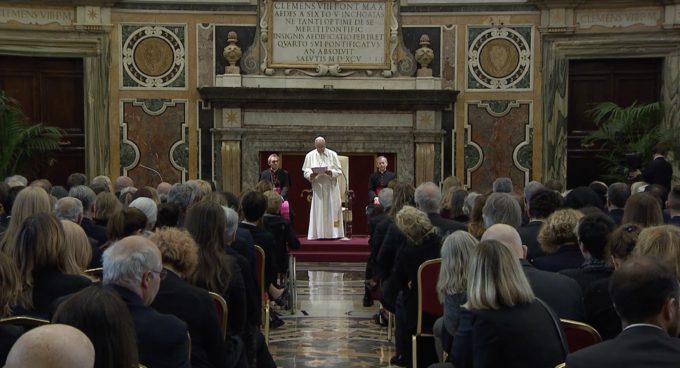
Below I will share a few photos, my speech in English and the Pope’s speech in Italian (the Vatican has not provided a translation and I am too lazy to do it myself.) Esma Cakir, the Turkish correspondent who preceded me as president of the Association, made a huge effort to obtain the audience for the Association and I am grateful to her.
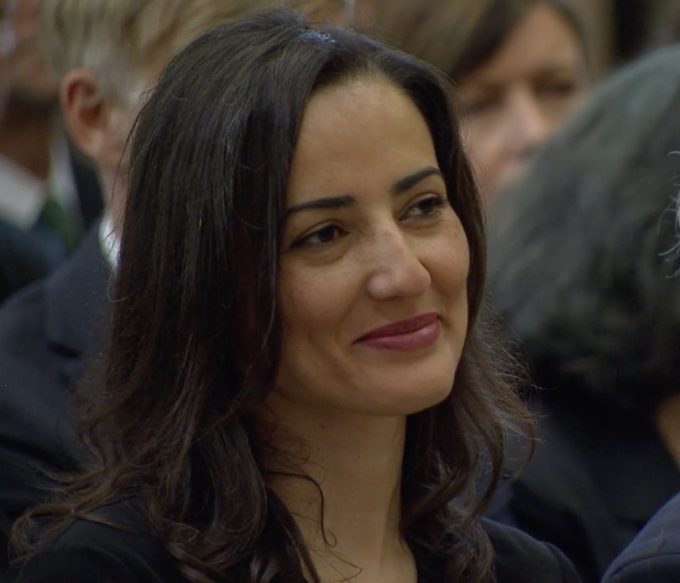
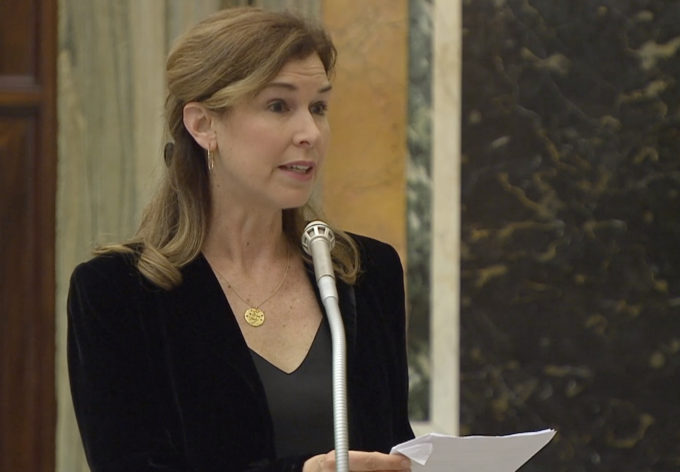
Here is my speech:
Holy Father,
The journalists of the Foreign Press Association have come today from across the Tiber, from our headquarters at 83 Humility Street. Yes, Humility street. That is what it is called. We are 400 journalists from 54 countries, and a host of beliefs.
We are an example of a multicultural and multireligious community open to dialogue and willing to widen our perspectives and horizons on a daily basis as we try to promote the ideals of freedom of opinion and expression.
As correspondents, it is our responsibility to report on events in Italy and the Vatican with our writing, our video, our photos, and our voices. I also hope that we do this with humility.
In recent years with the emergence of social media, the internet, and smart phones, our work has changed dramatically. We can do much more, much faster. It has been exciting, stimulating, challenging, sometimes frustrating and also dangerous.
You pointed out in your message for the 2019 World Day of Social Communications that the internet represents “an extraordinary possibility of access to knowledge” but it is also a source of “disinformation” and “conscious distortion of facts” which are “used to discredit.”
It is this disinformation and distortion that we are called on to fight.
Today the public is bombarded with information on their smart phones, on Facebook and twitter, with many young people paying more attention to information provided by “influencers” than by reporters.
As you observed in your message, social media are often used to encourage prejudice –ethnic, sexual, religious and other – thereby “fomenting spirals of hatred.” It is our responsibility, as journalists, to use our profession to contest hatred. We must carry the torch of truth through a blizzard of misinformation no matter how arduous and exhausting this might be.
In this inflamed and tense environment, journalists have increasingly become targets of violence. Many have been imprisoned or killed while searching for the truth, some on the frontlines during conflicts, others while investigating stories which made people in positions of power feel threatened.
The journalists you see before you are fortunate to work in Europe where values of liberty, democracy and freedom of the press prevail. But even here there are risks. Just last month, Lyra Mckee, a young woman journalist was killed while covering violent clashes in North Ireland. In 2017 Daphne Caruana Galizia died in a car bombing in Malta. Her investigations into the mafia, money-laundering and corruption had rattled authorities.
And not far from Europe, in 2018 Jamal Kashoggi, a journalist highly critical of the Saudi government, was brutally murdered in the Saudi Consulate in Istanbul.
These are the headline-grabbing names and cases. But journalists all over the world have been killed, injured, threatened or imprisoned, just for doing their work. According to the Committee for the Protection of Journalists, last year alone 54 journalists were killed and 250 imprisoned for reporting the news.
Today in many parts of the world, reporters are being discredited daily, accused of spreading fake news that is simply news that people in power don’t like to hear. The process of harassing and delegitimizing the media has had a corrosive effect, increasing popular distrust of all institutions. The danger of this trend is obvious.
The value of a free and independent press has never been more necessary than it is today. It is the foundation for democracy, critical to the rule of law and upholding human rights, and one of the most important guarantees against authoritarianism and unchecked abuses of power.
Today before you there are journalists who have interviewed Popes and Presidents. Others have covered Italian politics, art, fashion, food, and have covered natural disasters, like the recent earthquakes in central Italy.
Many of us in the past several years have focused on a topic of great concern to you, the influx of migrants to Europe and the suffering of hundreds of thousands of refugees in Italy. We have spent time on rescue boats in the Mediterranean, we have witnessed thousands of barefoot migrants descend the gangplanks of rescue ships in Sicilian ports, eager to step on European soil and fulfill their dreams of a better future.
Thank you for that acknowledgement of our work.
In January 1988, Pope John Paul II paid a visit to our headquarters. He told the journalists that it is our duty listen to the voices of every human being, every woman, man and child from every walk of life.
Advice useful still today.
To conclude, I would like to invite you, Holy Father, to visit us at the Foreign Press Association on Humility Street as your predecessor Pope John Paul II did in 1988.
On behalf of all the foreign press corps gathered before you here today, thank you, Holy Father, for your support and believing in the significance of the work we do.
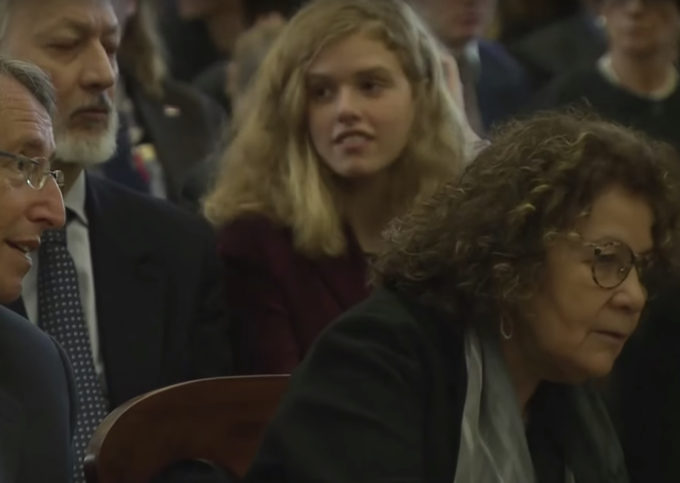
Here is the Pope’s Speech in English:
Dear Brothers and Sisters,
With pleasure I welcome you, together with your family, a few days after the celebration, in many countries, of World Communications Day. I thank the outgoing President, Mrs. Esma Çakir, and the new President, Mrs. Patricia Thomas, for the words they addressed to me.
I want to tell you first of all that I value your work; the Church esteems you, even when you put your finger on the wound, and perhaps the wound is in the ecclesial community. Yours is a precious work because it contributes to the search for truth, and only the truth makes us free. In this regard, I like to repeat what St. John Paul II said when he visited the headquarters of your Association 31 years ago: “The Church is on your side. Be Christian or not, in the Church you will always find the right esteem for your work and the recognition of freedom of the press “(17 January 1988: Insegnamenti XI, 1 [1988], 135).
Yours is an indispensable role, and this also gives you a great responsibility: it asks for a particular care for the words you use in your articles, for the images you transmit in your services, for everything you share on social media. This is why today I renew to you an exhortation that applies to everyone in the digital age: as Benedict XVI said, sometimes “the mass media tend to always make us feel” spectators “, as if the evil only concerned others, and certain things could never happen to us. Instead we are all “actors” and, in evil as well as in good, our behavior has an influence on others “(Speech in Piazza di Spagna, 8 December 2009: Insegnamenti V, 2 [2009], 672). I therefore urge you to work according to truth and justice, so that communication is really a tool to build, not to destroy; to meet, not to clash; to dialogue, not to monologize; to orient, not to disorient; to understand each other, not to misunderstand; to walk in peace, not to sow hatred; to give voice to those who have no voice, not to be the megaphone for those who shout louder.
I was struck by the many references to humility present in your President’s speech – after all, your headquarters is on Via dell’Umiltà! Humility is an essential virtue for spiritual life; but I would say that it can also be a fundamental element of your profession. Some of you might tell me: “Father, in our work there are other characteristics that count: professionalism, competence, historical memory, curiosity, writing skills, ability to investigate and ask the right questions, speed of synthesis, ability to make what happens to the vast public is understandable … “. Certainly. Yet humility can be the keystone of your business.
Each of us knows how difficult and how much humility the search for truth requires. And how much easier it is not to ask too many questions, to be satisfied with the first answers, to simplify, to remain on the surface, to appear; settle for discounted solutions, which do not know the fatigue of a survey capable of representing the complexity of real life. The humility of not knowing everything first is what drives research. The presumption of knowing everything is what blocks it.
Humble journalists do not mean mediocre, but rather aware that through an article, a tweet, a live television or radio you can do good but also, if you are not careful and scrupulous, of harm to others and sometimes to entire communities. I am thinking, for example, of how certain "shouted" titles can create a false representation of reality. A rectification is always necessary when one is wrong, but it is not enough to restore dignity, especially at a time when, through the Internet, false information can spread to the point of appearing authentic. For this, you journalists should always consider the power of the tool you have available, and resist the temptation to publish an insufficiently verified news.
In a time when many tend to pre-judge everything and everyone, humility also helps the journalist not to be dominated by haste, to try to stop, to find the time necessary to understand. Humility brings us closer to reality and to others with an attitude of understanding. The humble journalist tries to correctly know the facts in their entirety before telling and commenting on them. It does not nourish "the excess of slogans which, instead of setting the thought in motion, cancel it" (Speech to the managers, employees and operators of TV2000, 15 December 2014). It does not build stereotypes. He is not satisfied with representations of convenience that portray "individuals as if they were able to solve all problems, or on the contrary as scapegoats, on which to discharge all responsibility" (ibid.).
At a time when, especially in social media but not only, many use violent and derogatory language, with words that hurt and sometimes destroy people, it is rather to calibrate the language and, as your patron Saint Francis of Sales said in Philothea, use the word how the surgeon uses the scalpel (see chapter XXIX). In a time of too many hostile words, in which to speak ill of others has become for many a habit, together with that of classifying people, it must always be remembered that every person has his intangible dignity, which can never be taken away from him. At a time when many spread fake news, humility prevents you from selling the spoiled food of misinformation and invites you to offer the good bread of truth.
The humble journalist is a free journalist. Free from conditioning. Free from prejudices, and therefore courageous. Freedom requires courage!
I listened with pain to the statistics on your colleagues killed while doing their work with courage and dedication in many countries, to inform about what happens during the wars and the dramatic situations that so many of our brothers and sisters live in the world. Freedom of the press and of expression is an important index of a country’s state of health. Let us not forget that dictatorships, one of the first measures they take, are to remove the freedom of the press or “mask” it, do not leave the press free. «We need a free journalism, at the service of the true, of the good, of the right; a journalism that helps to build the culture of encounter “(Pontifex Tweet, 3 May 2019). We need journalists who are on the side of the victims, on the side of those who are persecuted, on the side of those who are excluded, rejected, discriminated against. You and your work are needed to be helped not to forget many situations of suffering, which often do not have the light of the spotlight, or they have it for a moment and then return to the darkness of indifference. A question that one of you asked me a short time ago comes to my heart and memory: “What do you think of forgotten wars?” But what wars do you forget? Those wars that are still going on but people forget about, are not on the agenda in the newspapers, in the media. Be careful: don’t forget the reality, because now “the blow has passed”. No, reality continues, we continue. This is a nice service. In concrete terms, wars forgotten by society, but which are still ongoing.
This is why I want to thank you for what you do. Because you help us not to forget the lives that are suffocated before they are even born; those that, when just born, are extinguished by hunger, hardship, lack of care, wars; the lives of child soldiers, the lives of violated children. Help us not to forget so many women and men persecuted for their faith or their ethnicity. I ask myself a question: who is speaking today about the Rohingya? Who’s talking about the Yazidis today? They are forgotten and continue to suffer. Help us not to forget that those forced – from calamities, wars, terrorism, hunger and thirst – to leave their land is not a number, but a face, a story, a desire for happiness. Your President talked about migrants: we must not forget this Mediterranean that is turning into a cemetery.
The humble and free journalist tries to tell the good, even if more often it is the evil that makes the news. What has always comforted me in my ministry as a bishop is to find out how much good there is between us, how many people sacrifice themselves - even heroically - to assist a parent or sick child, how many people engage in daily service to others, how many they stretch out their hands instead of turning away. Please continue to tell even that part of reality that thanks to God is still the most widespread: the reality of those who do not surrender to indifference, of those who do not flee before injustice, but build patiently in silence. There is a submerged ocean of good that deserves to be known and that gives strength to our hope. In this story, women are very attentive, and I am pleased to see that the contribution of women is fully recognized in your Association. Women see better and understand better, because they feel better.
In conclusion, I would like to assure you that I appreciate the commitment with which you carry out your work, which, lived in a spirit of service, becomes a mission. During my apostolic journeys I can realize the effort involved in your work. Furthermore, live far from your countries of origin and find yourself a mirror of the country in which you work, knowing how to grasp the positive and negative aspects. I invite you to be a mirror that knows how to reflect hope, sow hope. And I wish you to be humble and free men and women, who are the ones who leave a good imprint in history.
I thank you for this meeting. I bless you, your loved ones and your work. And you, too, please pray for me. And I would like to give everyone the blessing. I know that not all of you are believers, and for this I will do the blessing in silence, for everyone. May God bless everyone, bless everyone's heart. Amen.
Here is the Pope’s speech in Italian:
Cari fratelli e sorelle,
Con piacere vi do il benvenuto, insieme ai vostri familiari, a pochi giorni dalla celebrazione, in molti Paesi, della Giornata Mondiale delle Comunicazioni Sociali. Ringrazio la Presidente uscente, Signora Esma Çakir, e la nuova Presidente, Signora Patricia Thomas, per le parole che mi hanno rivolto.
Voglio dirvi anzitutto che stimo il vostro lavoro; la Chiesa vi stima, anche quando mettete il dito sulla piaga, e magari la piaga è nella comunità ecclesiale. Il vostro è un lavoro prezioso perché contribuisce alla ricerca della verità, e solo la verità ci rende liberi. A questo riguardo, mi piace ripetere quanto disse San Giovanni Paolo II, visitando la sede della vostra Associazione, 31 anni fa: «La Chiesa sta dalla vostra parte. Siate cristiani o no, nella Chiesa troverete sempre la giusta stima per il vostro lavoro e il riconoscimento della libertà di stampa» (17 gennaio 1988: Insegnamenti XI, 1 [1988], 135).
Il vostro è un ruolo indispensabile, e questo vi affida anche una grande responsabilità: vi chiede una cura particolare per le parole che utilizzate nei vostri articoli, per le immagini che trasmettete nei vostri servizi, per tutto ciò che condividete sui social media. Per questo oggi rinnovo a voi un’esortazione che nell’era digitale vale per tutti: come ha detto Benedetto XVI, a volte «i mass media tendono a farci sentire sempre “spettatori”, come se il male riguardasse solamente gli altri, e certe cose a noi non potessero mai accadere. Invece siamo tutti “attori” e, nel male come nel bene, il nostro comportamento ha un influsso sugli altri» (Discorso in Piazza di Spagna, 8 dicembre 2009: Insegnamenti V, 2 [2009], 672). Vi esorto dunque a operare secondo verità e giustizia, affinché la comunicazione sia davvero strumento per costruire, non per distruggere; per incontrarsi, non per scontrarsi; per dialogare, non per monologare; per orientare, non per disorientare; per capirsi, non per fraintendersi; per camminare in pace, non per seminare odio; per dare voce a chi non ha voce, non per fare da megafono a chi urla più forte.
Mi hanno colpito i molteplici riferimenti all’umiltà presenti nel discorso della vostra Presidente – del resto, la vostra sede si trova in Via dell’Umiltà! L’umiltà è una virtù essenziale per la vita spirituale; ma direi che può essere anche un elemento fondamentale della vostra professione. Qualcuno di voi potrebbe dirmi: “Padre, nel nostro lavoro sono altre le caratteristiche che contano: professionalità, competenza, memoria storica, curiosità, capacità di scrittura, abilità nell’indagare e nel porre le giuste domande, velocità di sintesi, abilità nel rendere comprensibile al vasto pubblico ciò che accade…”. Certamente. Eppure l’umiltà può essere la chiave di volta della vostra attività.
Ognuno di noi sa quanto sia difficile e quanta umiltà richieda la ricerca della verità. E quanto sia più facile non farsi troppe domande, accontentarsi delle prime risposte, semplificare, rimanere alla superficie, all’apparenza; accontentarsi di soluzioni scontate, che non conoscono la fatica di un’indagine capace di rappresentare la complessità della vita reale. L’umiltà del non sapere tutto prima è ciò che muove la ricerca. La presunzione di sapere già tutto è ciò che la blocca.
Giornalisti umili non vuol dire mediocri, ma piuttosto consapevoli che attraverso un articolo, un tweet, una diretta televisiva o radiofonica si può fare del bene ma anche, se non si è attenti e scrupolosi, del male al prossimo e a volte ad intere comunità. Penso, per esempio, a come certi titoli “gridati” possono creare una falsa rappresentazione della realtà. Una rettifica è sempre necessaria quando si sbaglia, ma non basta a restituire la dignità, specie in un tempo in cui, attraverso Internet, una informazione falsa può diffondersi al punto da apparire autentica. Per questo, voi giornalisti dovreste sempre considerare la potenza dello strumento che avete a disposizione, e resisterealla tentazione di pubblicare una notizia non sufficientemente verificata.
In un tempo in cui molti tendono a pre-giudicare tutto e tutti, l’umiltà aiuta anche il giornalista a non farsi dominare dalla fretta, a cercare di fermarsi, di trovare il tempo necessario per capire. L’umiltà ci fa accostare alla realtà e agli altri con l’atteggiamento della comprensione. Il giornalista umile cerca di conoscere correttamente i fatti nella loro completezza prima di raccontarli e commentarli. Non alimenta «l’eccesso di slogan che, invece di mettere in moto il pensiero, lo annullano» (Discorso ai dirigenti, dipendenti e operatori di TV2000, 15 dicembre 2014). Non costruisce stereotipi. Non si accontenta delle rappresentazioni di comodo che ritraggono «singole persone come se fossero in grado di risolvere tutti i problemi, o al contrario come capri espiatori, su cui scaricare ogni responsabilità» (ibid.).
In un tempo in cui, specialmente nei social media ma non solo, molti usano un linguaggio violento e spregiativo, con parole che feriscono e a volte distruggono le persone, si tratta invece di calibrare il linguaggio e, come diceva il vostro Santo protettore Francesco di Sales nella Filotea, usare la parola come il chirurgo usa il bisturi (cfr cap. XXIX). In un tempo di troppe parole ostili, in cui dire male degli altri è diventato per molti un’abitudine, insieme a quella di classificare le persone, bisogna sempre ricordarsi che ogni persona ha la sua intangibile dignità, che mai le può essere tolta. In un tempo in cui molti diffondono fake news, l’umiltà ti impedisce di smerciare il cibo avariato della disinformazione e ti invita ad offrire il pane buono della verità.
Il giornalista umile è un giornalista libero. Libero dai condizionamenti. Libero dai pregiudizi, e per questo coraggioso. La libertà richiede coraggio!
Ho ascoltato con dolore le statistiche sui vostri colleghi uccisi mentre facevano il loro lavoro con coraggio e dedizione in tanti Paesi, per informare su ciò che accade durante le guerre e le situazioni drammatiche che vivono tanti nostri fratelli e sorelle nel mondo. La libertà di stampa e di espressione èun indice importante dello stato di salute di un Paese. Non dimetichiamo che le dittature, una delle prime misure che fanno, è togliere la libertà di stampa o “mascherarla”, non lasciare libera la stampa. «Abbiamo bisogno di un giornalismo libero, al servizio del vero, del bene, del giusto; un giornalismo che aiuti a costruire la cultura dell’incontro» (Tweet di Pontifex, 3 maggio 2019). Abbiamo bisogno di giornalisti che stiano dalla parte delle vittime, dalla parte di chi è perseguitato, dalla parte di chi è escluso, scartato, discriminato. C’è bisogno di voi e del vostro lavoro per essere aiutati a non dimenticare tante situazioni di sofferenza, che spesso non hanno la luce dei riflettori, oppure ce l’hanno per un momento e poi ritornano nel buio dell’indifferenza. Mi viene al cuore e alla memoria una domanda che uno di voi mi aveva fatto poco tempo fa: “Cosa pensa Lei delle guerre dimenticate?”. Ma quali guerre dimenticate? Quelle guerre che ancora sono in corso ma di cui la gente si dimentica, non sono all’ordine del giorno nei giornali, nei media. State attenti: non dimanticare la realtà, perché adesso “è passato il colpo”. No, la realtà continua, continuaiamo noi. È un bel servizio questo. In concreto, le guerre dimenticate dalla società, ma che sono in corso ancora.
Per questo voglio ringraziarvi per quello che fate. Perché ci aiutate a non dimenticare le vite che vengono soffocate prima ancora di nascere; quelle che, appena nate, vengono spente dalla fame, dagli stenti, dalla mancanza di cure, dalle guerre; le vite dei bambini-soldato, le vite dei bambini violati. Ci aiutate a non dimenticare tante donne e uomini perseguitati per la loro fede o la loro etnia. Mi permetto una domanda: chi parla oggi dei Rohingya? Chi parla oggi dei Yazidi? Sono dimenticati e continuano a soffrire. Ci aiutate a non dimenticare che chi è costretto – da calamità, guerre, terrorismo, fame e sete – a lasciare la propria terra non è un numero, ma un volto, una storia, un desiderio di felicità. La vostra Presidente ha parlato dei migranti: non bisogna dimenticare questo Mediterraneo che si sta trasformando in cimitero.
Il giornalista umile e libero cerca di raccontare il bene, anche se più spesso è il male a fare notizia. Ciò che mi ha sempre confortato nel mio ministero di vescovo è scoprire quanto bene esiste tra di noi, quante persone si sacrificano – anche eroicamente – per assistere un genitore o un figlio malato, quante persone s’impegnano ogni giorno nel servizio agli altri, quante tendono la mano invece di girarsi dall’altra parte. Vi prego, continuate a raccontare anche quella parte della realtà che grazie a Dio è ancora la più diffusa: la realtà di chi non si arrende all’indifferenza, di chi non fugge davanti all’ingiustizia, ma costruisce con pazienza nel silenzio. C’è un oceano sommerso di bene che merita di essere conosciuto e che dà forza alla nostra speranza. In questo raccontare la vita sono molto attente le donne, e vedo con piacere che nella vostra Associazione il contributo femminile è pienamente riconosciuto. Le donne vedono meglio e capiscono meglio, perché sentono meglio.
In conclusione, vorrei assicurarvi che apprezzo l’impegno con cui svolgete il vostro lavoro, che, vissuto in spirito di servizio, diventa una missione. Durante i miei viaggi apostolici posso rendermi conto della fatica che comporta il vostro lavoro. Inoltre, vivete lontani dai vostri Paesi di origine e vi trovate ad essere specchio del Paese in cui lavorate, sapendone cogliere gli aspetti positivi e quelli negativi. Vi invito a essere uno specchio che sa riflettere speranza, seminare speranza. E vi auguro di essere donne e uomini umili e liberi, che sono quelli che lasciano una buona impronta nella storia.
Vi ringrazio per questo incontro. Benedico voi, i vostri cari e il vostro lavoro. E anche voi, per favore, pregate per me. E vorrei dare a tutti la benedizione. So che non tutti voi siete credenti, e per questo farò la benedizione in silenzio, per tutti. Che Dio benedica tutti, benedica il cuore di tutti. Amen.
Here is the link to the whole event if you want to watch it.
https://www.youtube.com/watch?v=J0omb3V_jcA
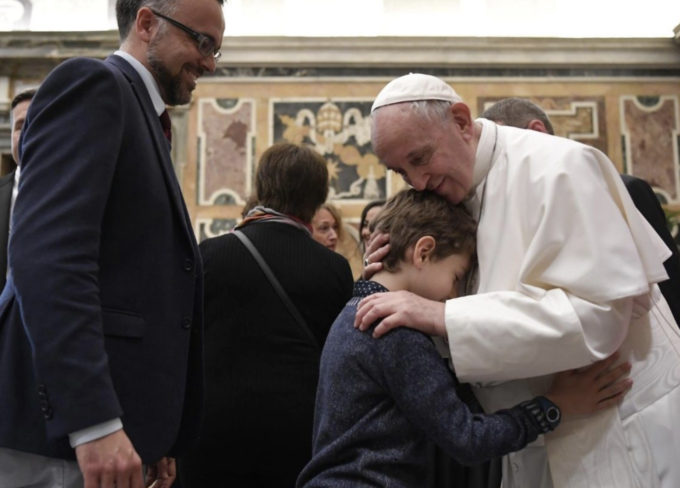
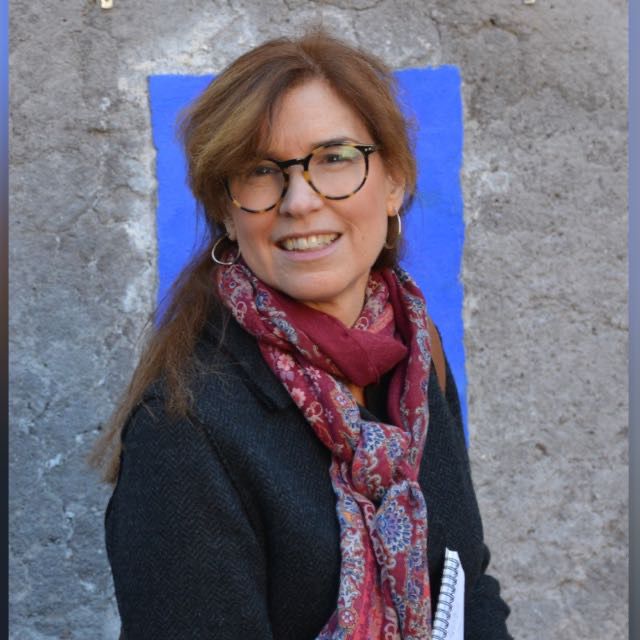
Brava!
This was so encouraging to read. Thank you for sharing this with all of us. I am so tired of reading about the press being attacked. It is time all of us on the sidelines stand and support a free and professional working press. Thank you for the work you do.
Thank you!!
I apologize for another Great Silence. Life keeps getting in my way. What an inspiring article, a joy to read. Keep up the wonderful and important work.
Thank you Adri. No need to apologize. I always love hearing from you whenever it is possible. Hope you are well. Big hugs.
If “journalists “ wish to understand why a part of their intended audience has rejected them, then you should re-examine your own speech for the overwhelming bias you represent. Perhaps you see it and think it is your duty, or maybe you are unaware. Either way just about everything you wrote/spoke was the opposite of journalism. It is political activism, and it is that political activism masquerading as factual reporting that has justifiably earned so many in the media the ire of their suffering audience. You represent ‘journalists’ as arbiters of truth, when in fact they take sides in political contests. The media is constantly taking the side of one political force and actively suppressing the message, statements and actions of another. So long as you do that, you are not journalists. You are politicians pretending to be aloof and above the political fray. This is why your standing has fallen so badly among so many. And while we are on the subject of social media, why did you not stand up for those whose voices are artificially suppressed by the social media monopolies? I’m sorry to say it, but you are not victims, you are victimizers, oppressors.
Well, American Joe, I don’t feel as though I am an arbiter of truth, an oppressor, or a victimizer, but I am the arbiter of comments on my blog, and I am always open to debate and criticism. So, I am approving your comment in the hopes that it will stimulate further thought on the topic. Thank you for sharing your opinion.
What a great honor to have an audience with the Pope to speak about justice and truth. Thank you and your colleagues for the important work you do at times going “against the grain” to do the difficult work of balanced and impartial journalism. What courageous and honorable work you do.
Thank you Chris. Actually, I think your work as a doctor is more courageous and honorable, but I appreciate your support of mine.
Trisha,
I finally had the opportunity to read the entire post after a very busy and chaotic start to the end of the school year. What an amazing and historic interchange! Your speech is appropriate for the UN and the US Congress. Thank you, thank you!!!!!
Thank you Lega. It was such an honor to be able to speak to the Pope about some of the concerns facing the press these days and to hear his thoughtful response. A once in a lifetime experience!